*** Update – this blog has been amended June 2020 to add a video at the end.***
Anxiety and depression
Anxiety and depression are the two most common mental health disorders. Their cost to the individual and to society is huge. Pharmaceutical treatments are not always effective, and can have unpleasant side-effects.
Laureate Institute for Brain Research (LIBR)
There is a team of people at the Laureate Institute for Brain Research (LIBR) in Tulsa, Oklahoma, who have a passion for finding better treatments for mental health. Within LIBR is the Float Clinic & Research Center, led by Dr. Justin Feinstein. The centre contains open float pools that were custom-designed for research purposes. Justin Feinstein and his team are exploring the potential that floating has to help people suffering with anxiety and depression.
In February 2018 they published results from a peer-reviewed study. We find this study very interesting not just for its findings, but because it lays the groundwork for future research.
History of related research
The majority of past floatation research was done in the 1980’s and 1990’s, mainly working with small groups of healthy participants. A meta-analysis of 27 floatation studies demonstrated significant stress reduction, but most of these studies still focused exclusively on healthy people.
Two other studies were published focusing on participants with self-reported symptoms of “generalised anxiety”. These examined long-term effects of repeated floats, but not the short-term effects from a single float. The first study found that after around 7 float sessions, patients with generalised anxiety reported improvement in symptoms when assessed around 7 months later. The second study observed a significant reduction in symptoms of generalized anxiety 6 months after taking part in 12 floats.
Up until this recent research, no studies had examined the effects of floatation on post traumatic stress disorder (PTSD), panic disorder, agoraphobia, social anxiety disorder, or major depressive disorder. There has been much anecdotal evidence of floating helping people suffering with these conditions. But other than a few individual case studies, there had been no other research investigating the impact of floatation on patients with clinically diagnosed anxiety or depression, or any other mental health disorder.
The first study of its kind
As a result, this is the first study of its kind, and hopefully the first of many more to come. The research was published in a peer-reviewed journal called Public Library of Science, or PLOS One. This is a journal with a mission to make science freely available to the general public.
The aims of the study
The team started with the hypothesis that floating would help people regardless of the source of their anxiety. They suspected that floating goes to the source of the mechanism in the brain.
The goal was to see if they could demonstrate a clear clinical effect. To see whether floatation can be safe for people with anxiety and depression, as a precursor to future research.
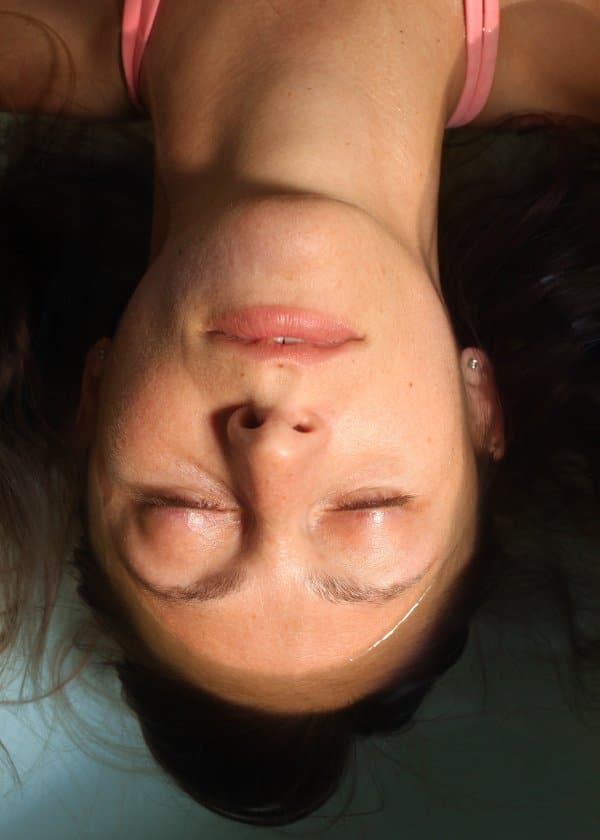
The limitations of this study
This was a preliminary clinical trial, not blind. It is hard to find a blind control for floating as there is nothing else quite like it, and no chance that you don’t realise you’re doing it, unlike a placebo pill.
The study took part in an open float pool in a controlled environment with medical staff on hand. While this is somewhat different to most commercial float centres, it is hoped that future studies will show that similar results can be obtained in the setting of a commercial float centre.
Participants took part in just one 60 minute float each.

Participants
In this study the team worked with people who are clinically anxious (moderate to severe). These were people who have significant impairments in their life as a result, for example difficulty holding down a job, a relationship, or even leaving the house. They worked with the entire spectrum of anxiety disorders: post traumatic stress, generalized anxiety, panic, agoraphobia, and social anxiety.
Participants were recruited from the ‘T1000’. The T1000 project is a groundbreaking new study within LIBR. The project was set up to recruit 1000 local people with a range of mental health issues. It aims to determine how biological, objective and behavioural measures (including brain scans and ECGs) can improve assessment and treatment of people with disorders of mood and anxiety, eating and substance use.
121 participants from the T1000 group were eligible at the time, of whom 50 were willing to take part. (Most studies on clinical anxiety have only about 10 – 30 participants, because most people with anxiety tend to avoid things like this). 46 of the 50 people had depression as well as anxiety.
The team compared outcomes collected from 30 healthy non-anxious individuals who were tested in a separate study. That data was used simply as a point of reference for the float-related findings in anxious individuals.

Instructions
The anxious participants were instructed that they could float for “up to 60 minutes” and that they could end the float at any time. They were given the choice about whether to they wanted turn the light off or not. Care was taken to avoid bias. Staff were clear with the participants that they didn’t know whether floating would work for them. They encouraged the participants to be honest, including exploring any negative experiences.
Measures
Patients took part in 3 different types of self-report measures:
- baseline measures
- pre / post-float measures
- follow-up questions
Pre / post-float measures were collected approximately 30 minutes before and after each float session.
100% positive short-term effects
It is very rare in clinical trials to have unanimous positive results. Yet in this case 100% of participants reported positive short-term effects.
48 out of 50 stayed in the float pool for the whole hour. Generally the patients were surprised by how quickly their float passed, and how much they actually enjoyed the experience. At the end of the float, participants were queried about the 60 minute length of the float. 24 said they wanted to stay in longer, 15 said it was the perfect amount of time, and only 11 said they were ready to get out before the hour had elapsed.
Patients were given the choice about whether to turn the light off or not. Those who did turn the lights off experienced greater levels of happiness and serenity afterwards.
Every single patient showed a reduction of anxiety from pre to post float. The most severely anxious participants reported the largest effects.
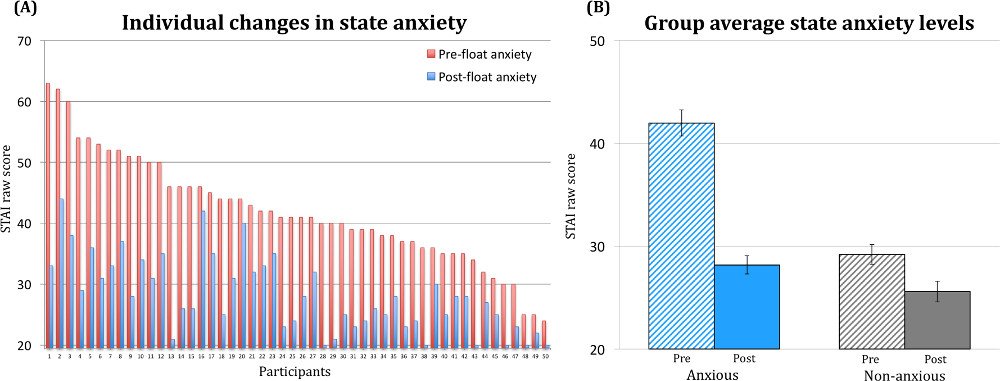
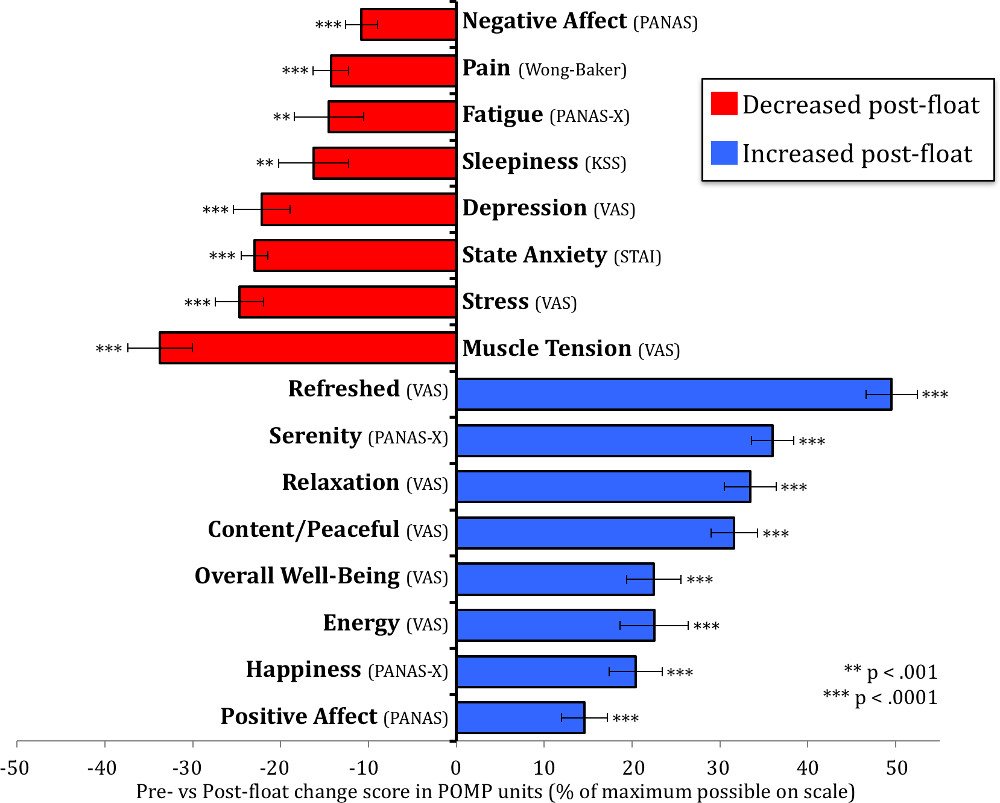
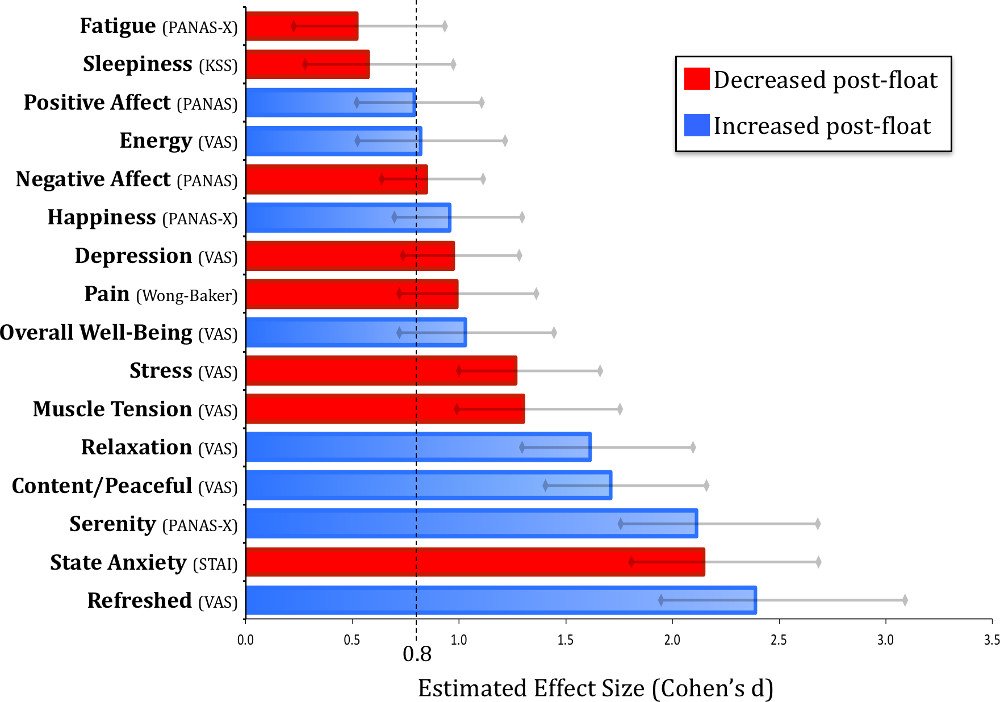
Serenity and relaxation
Participants were presented with a list of side effects to report on. Despite there being twice as many negative options available as positive, reports of positive experiences overshadowed all of the negative ones. The top 10 rated effects were all positive, with the top 3 being:
- “A feeling of total serenity and peacefulness”
- “Total relaxation of body (without any muscle tension)”
- “Feeling completely refreshed, like the reset button was hit”
All 50 participants requested to float again. 47 of the participants thought that floating had the potential to be an effective therapy for reducing stress and anxiety and improving mood. 37 of the participants reported that they achieved more relaxation with floating than any other treatment or technique they had tried in the past.
Question – “Overall, how was your float today?”
Question – “Did you learn anything about yourself during this experience?”
Conclusions
This study found that a single one-hour session of floatation was capable of inducing a strong reduction in anxiety and a substantial improvement in mood in a group of 50 anxious and depressed participants spanning a range of different anxiety and stress-related disorders.
Beyond the immediate dissipation of anxiety, the float experience also induced:
- a significant decrease in self-reported stress, muscle tension, pain, depression, and negative affect
- a significant increase in serenity, relaxation, happiness, positive affect, overall well-being, energy levels, and feeling refreshed, content and peaceful.
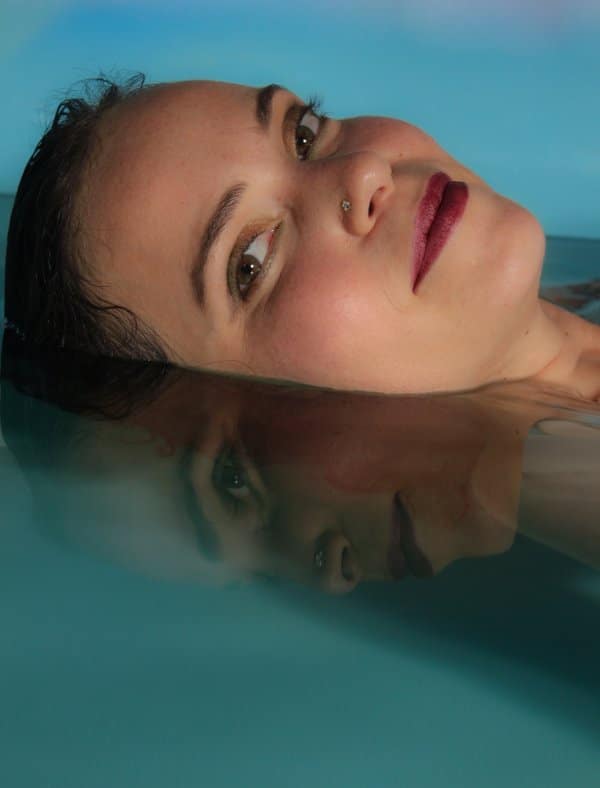
As Dr. Justin Feinstein says:
Plans for future research
The team have exciting plans for a series of studies in the future, many of which are already underway:
- testing how long the relaxation continues after a float
- the cumulative effects of floating regularly as a practice
- carrying out research in a typical float centre, ie with pods that close, and no medical staff on hand
- working with people suffering from anorexia
- research with people suffering from opiate addiction
- studies using an active control eg. an already validated treatment such as anxiety medications
We are looking forward to hearing more from the team at LIBR, and plan to keep you updated as more research comes out.
Thanks to the wonderful PLOS One journal, you are able to read the whole study and also the see the complete raw data set, here.
**Update June 2020:**
Dr. Justin Feinstein and his team have been working on some exciting research into the benefits of floating for anxiety and in combatting the stressful effects of our ‘always on’ culture.
It’s well worth investing 15 minutes of your life to discover the startling empirical evidence for the benefits of floating in this Ted Talk:





